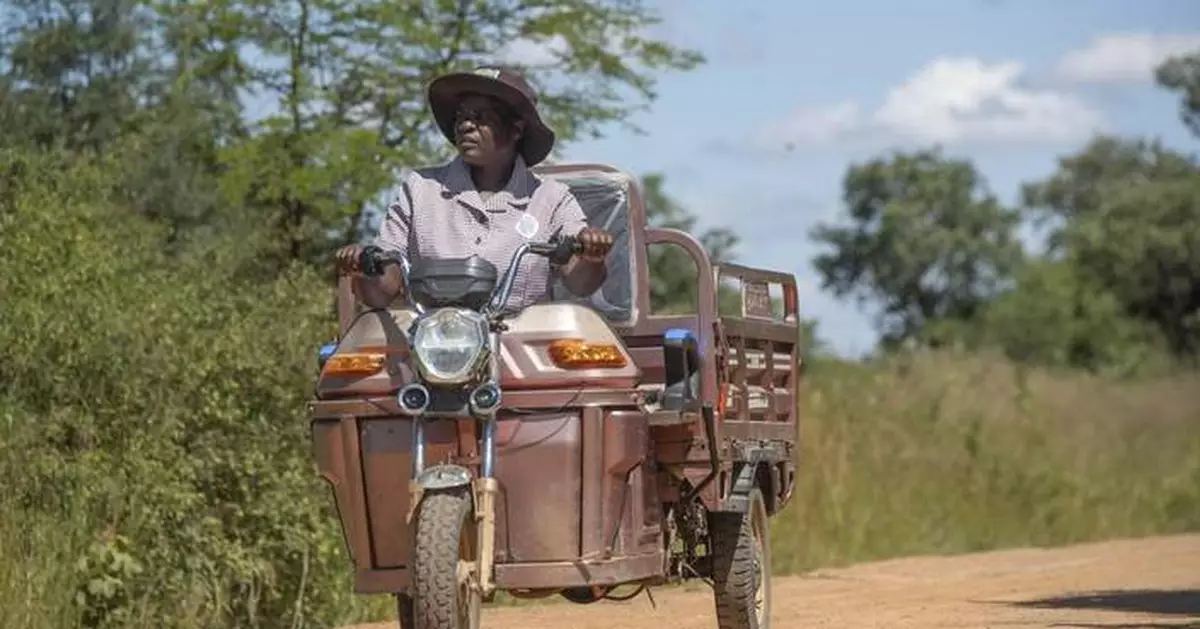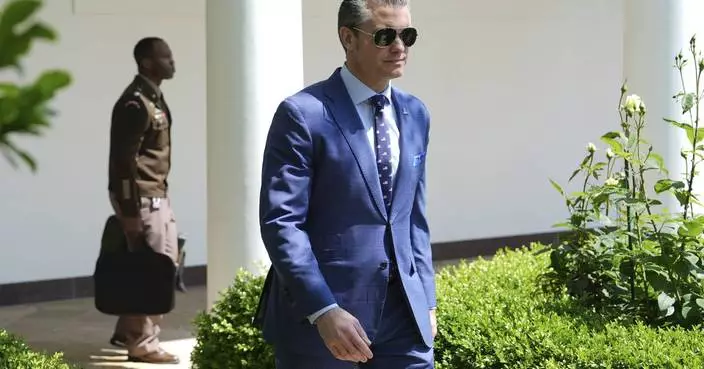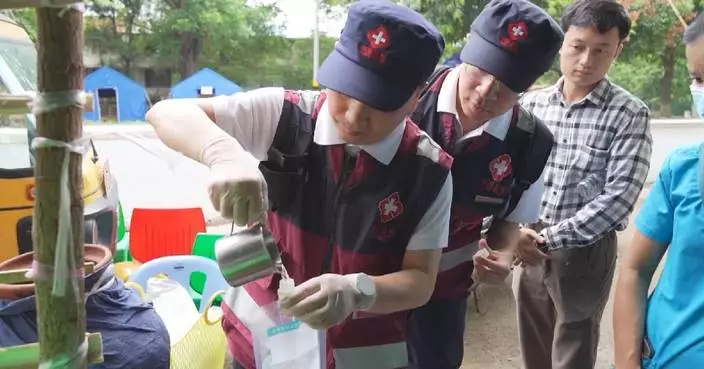WEDZA, Zimbabwe (AP) — Anna Bhobho, a 31-year-old housewife from rural Zimbabwe, was once a silent observer in her home, excluded from financial and family decision-making in the deeply patriarchal society. Today, she is a driver of change in her village, thanks to an electric tricycle she now owns.
In many parts of rural sub-Saharan Africa, women have long been excluded from mainstream economic activities such as operating public transportation. However, three-wheelers powered by green energy are reversing that trend, offering financial opportunities and a newfound sense of importance.
Click to Gallery
Women ride on an electric tricycle laden with tomatoes to a market in Hwedza, Zimbabwe, Thursday, March 06 2025. (AP Photo/Aaron Ufumeli)
Anna Bhobho delivers tomatoes to a market place on her electric tricycle in Hwedza, Zimbabwe, Thursday, March 6 2025. (AP Photo/Aaron Ufumeli)
Vendors pick tomatoes from the back of an electric tricycle in Hwedza, Zimbabwe, Thursday, March 6 2025. (AP Photo/Aaron Ufumeli)
Women carry a box of tomatoes to a waiting electric tricycle in Hwedza, Zimbabwe, Thursday, March 6 2025. (AP Photo/Aaron Ufumeli)
Women sit on their three wheeler tri-cycles waiting for clients at a market place in Hwedza, Zimbabwe, Thursday, March 6, 2025. (AP Photo/Aaron Ufumeli)
Josephine Nyevhe, a volunteer village health worker, conducts weekly visits on her electric tricycle in Hwedza Zimbabwe, Thursday, March 6 2025. (AP Photo/Aaron Ufumeli)
“My husband now looks up to me to take care of a large chunk of expenses, including buying furniture and other assets,” Bhobho said at a market where she delivers crops for farmers in Wedza district, about 150 kilometers (nearly 100 miles) from Harare.
Called “Hamba,” meaning “go” in Ndebele, the tricycles are powered by solar-charged lithium-ion batteries. Mobility for Africa, a local startup, piloted the project in 2019 by leasing the vehicles to groups of women for $15 a month. Today, individual women like Bhobho can own them through a lease-to-purchase program.
“I used to depend on my husband for everything, even money for bread,” she said.
Bhobho now owns land, has opened a small grocery store, is paying off a car and has moved her children from an underfunded rural public school to a better-equipped private institution. She earns up to $300 a month, comparable to government workers like schoolteachers.
Beyond material gains, she has gained self-esteem.
“Even my husband and in-laws have more respect for me now. No one used to listen to me, but now I have a seat when important decisions are being made,” the mother of three said.
According to Carlin Thandi Ngandu, the community engagement coordinator for Mobility for Africa, 300 women across Zimbabwe are part of the program, with a goal of ensuring that 70% of the beneficiaries are women.
In Wedza, only women own and operate the tricycles. They receive training in safe driving skills, and swapping a lithium battery for a fully recharged one after about 100 kilometers (about 70 miles) costs $1.
Motorcycles are a common public transport in sub-Saharan Africa, with some now switching to electric to cut fuel costs. The United Nations environmental program is introducing electric two and three-wheelers in nine countries, mostly in East Africa. In Nigeria, a green energy firm and the United Kingdom’s Foreign Office are providing 120 electric three-wheelers to women, promoting sustainability and economic empowerment.
In Zimbabwe, the lives of many women have changed dramatically, even for those who don’t own tricycles but use them for daily chores. Gone are the days of carrying firewood, buckets of water or heavy farm produce over long distances.
The tricycles, able to navigate narrow paths inaccessible to cars, reach remote homesteads and vegetable gardens. Their affordability makes them accessible to locals.
Hilda Takadini, a tomato farmer, said her business has flourished since she started using Bhobho’s transport services. Previously, she had to leave home at 3 a.m., using an ox-drawn cart to travel 18 kilometers (11 miles) to the market. Often, she arrived too late or not at all, and her tomatoes rotted.
“I get better prices because now I reach the market on time with my tomatoes still fresh. Even the children now know they can rely on me for school fees,” said the 34-year-old mother of six.
At Wedza shopping center, nearly a dozen women line up with their tricycles, which can carry loads of up to 450 kilograms (nearly 1,000 pounds) and have a top speed of 60 kph (37 mph), waiting for customers. They transport passengers, patients heading to hospitals and people carrying building materials such as bricks, groceries and firewood.
However, the women have to contend with challenges such as rough terrain worsened by recent rains, as well as a number of men resistant to seeing women lead in traditionally male-dominated spaces, Bhobho said.
Beyond business, the tricycles are revolutionizing health care access, particularly for women and children. Josephine Nyevhe, a volunteer community health worker, uses her tricycle to bring medical services closer to rural families.
On a recent afternoon, a group of mothers with children waited at a roadside. Nyevhe arrived on her tricycle, hung a weighing scale on a tree branch and began measuring the children’s growth. She recorded details in her notebook, offered nutrition advice and referred severe cases to the local clinic.
Many times, her tricycle has served as a village ambulance.
“I am on 24-hour standby. I get calls during odd hours and have to rush people to the hospital. Sometimes it’s a pregnant woman who would have otherwise given birth at home in unsafe conditions,” said Nyevhe, wearing her brown uniform.
For more on Africa and development: https://apnews.com/hub/africa-pulse
The Associated Press receives financial support for global health and development coverage in Africa from the Gates Foundation. The AP is solely responsible for all content. Find AP’s standards for working with philanthropies, a list of supporters and funded coverage areas at AP.org.

Women ride on an electric tricycle laden with tomatoes to a market in Hwedza, Zimbabwe, Thursday, March 06 2025. (AP Photo/Aaron Ufumeli)
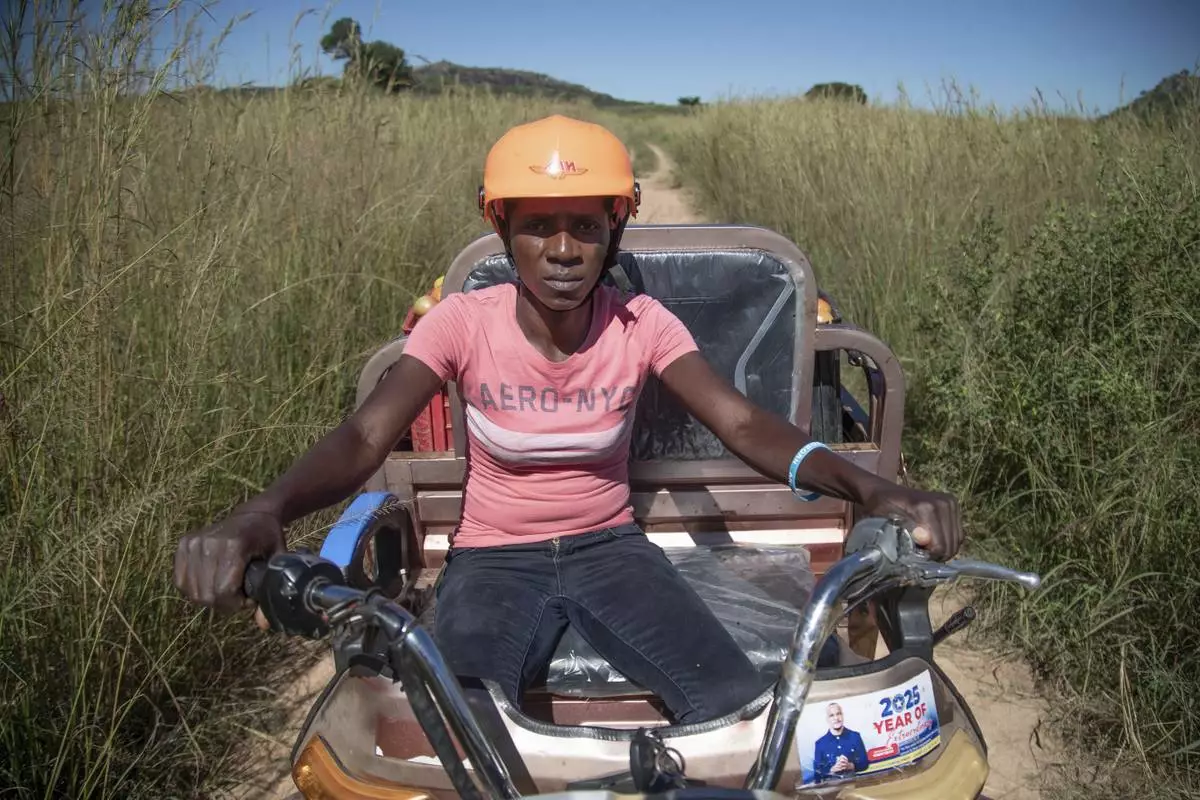
Anna Bhobho delivers tomatoes to a market place on her electric tricycle in Hwedza, Zimbabwe, Thursday, March 6 2025. (AP Photo/Aaron Ufumeli)

Vendors pick tomatoes from the back of an electric tricycle in Hwedza, Zimbabwe, Thursday, March 6 2025. (AP Photo/Aaron Ufumeli)

Women carry a box of tomatoes to a waiting electric tricycle in Hwedza, Zimbabwe, Thursday, March 6 2025. (AP Photo/Aaron Ufumeli)
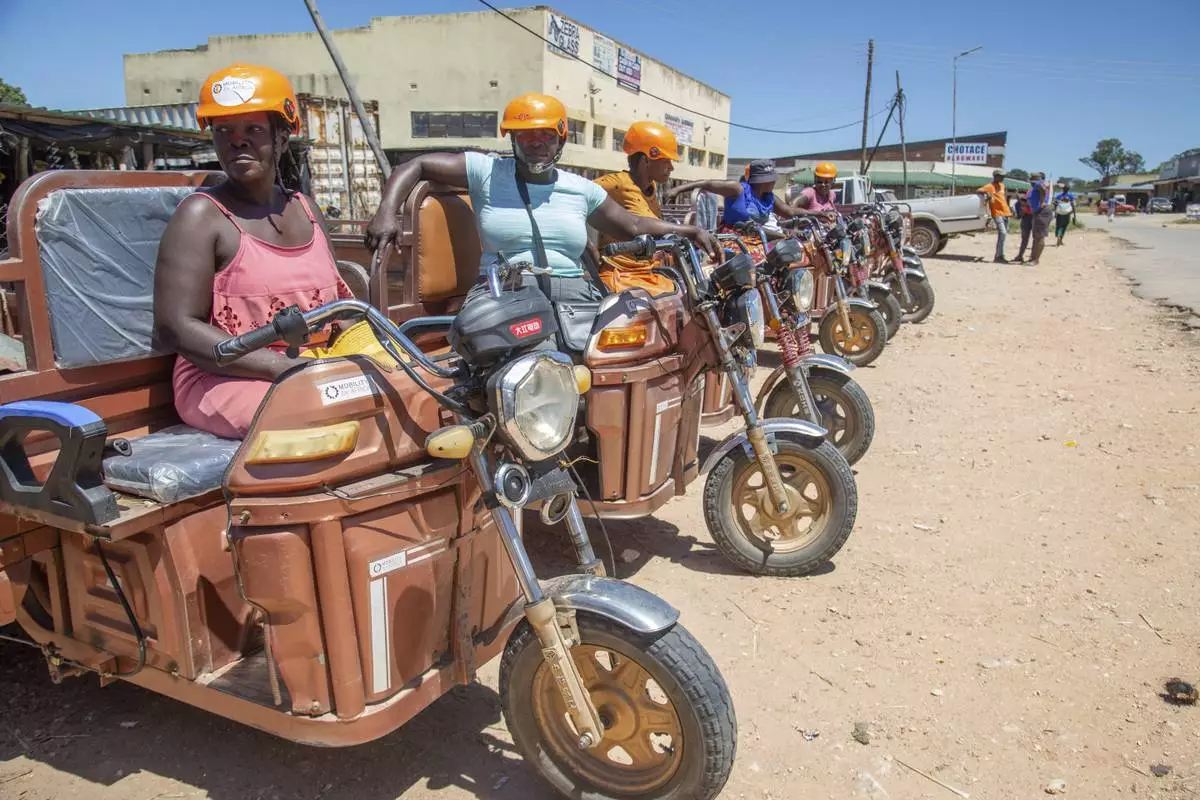
Women sit on their three wheeler tri-cycles waiting for clients at a market place in Hwedza, Zimbabwe, Thursday, March 6, 2025. (AP Photo/Aaron Ufumeli)
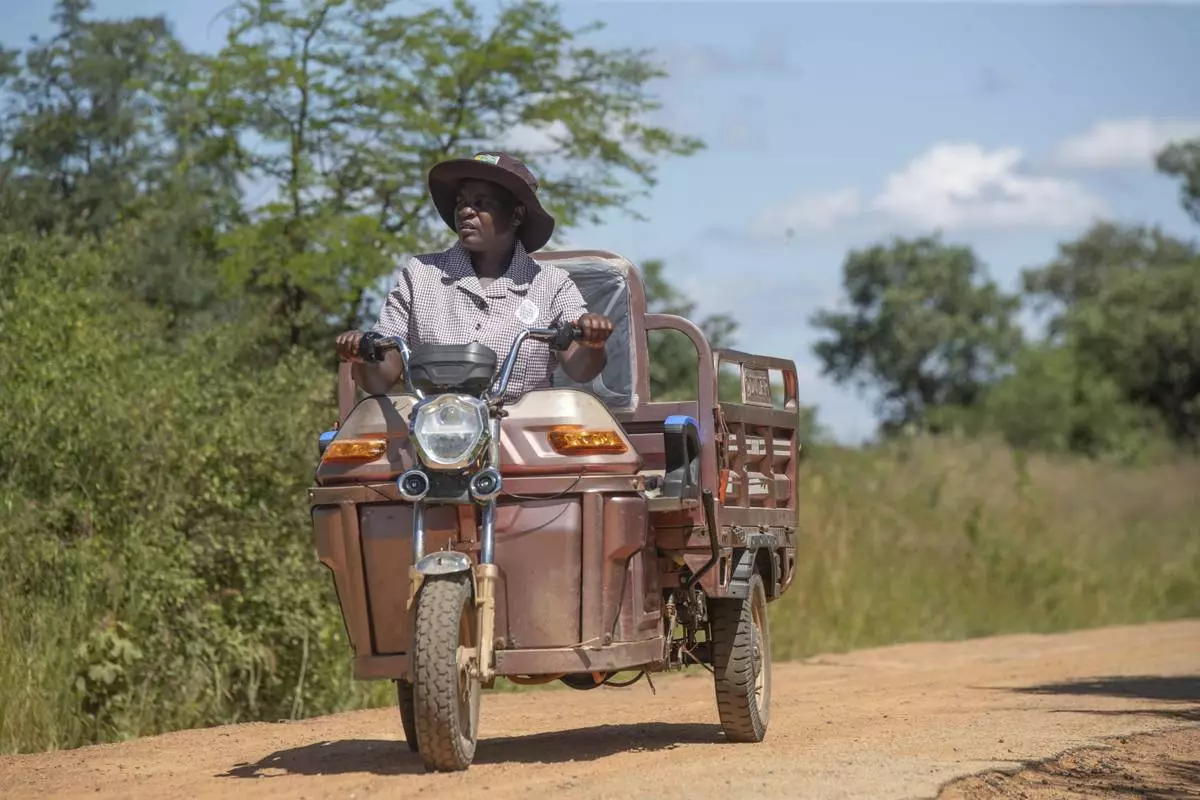
Josephine Nyevhe, a volunteer village health worker, conducts weekly visits on her electric tricycle in Hwedza Zimbabwe, Thursday, March 6 2025. (AP Photo/Aaron Ufumeli)
LOS ANGELES (AP) — Ruth Buzzi, who rose to fame as the frumpy and bitter Gladys Ormphby on the groundbreaking sketch comedy series “Rowan & Martin’s Laugh-In” and made over 200 television appearances during a 45-year career, has died at age 88.
Buzzi died Thursday at her home in Texas, her agent Mike Eisenstadt said. She had been diagnosed with Alzheimer's and was in hospice care. Shortly before her death, her husband Kent Perkins, had posted a statement on Buzzi's Facebook page, thanking her many fans and telling them: “She wants you to know she probably had more fun doing those shows than you had watching them.”
Buzzi won a Golden Globe and was a two-time Emmy nominee for the NBC show that ran from 1968 to 1973. She was the only regular to appear in all six seasons, including the pilot.
She was first spotted by “Laugh-In” creator and producer George Schlatter playing various characters on “The Steve Allen Comedy Hour.”
Schlatter was holding auditions for “Laugh-In” when he received a picture in the mail of Buzzi in her Ormphby costume, sitting in a wire mesh trash barrel. The character was clad in drab brown with her bun covered by a hairnet knotted in the middle of her forehead.
“I think I hired her because of my passion for Gladys Ormphby,” he wrote in his 2023 memoir “Still Laughing A Life in Comedy.” “I must admit that the hairnet and the rolled-down stockings did light my fire. My favorite Gladys line was when she announced that the day of the office Christmas party, they sent her home early.”
The Gladys character used her purse as a weapon against anyone who bothered her, striking people over the head. On “Laugh-In,” her most frequent target was Arte Johnson’s dirty old man character Tyrone F. Horneigh.
“Gladys embodies the overlooked, the downtrodden, the taken for granted, the struggler,” Buzzi told The Connecticut Post in 2018. “So when she fights back, she speaks for everyone who’s been marginalized, reduced to a sex object or otherwise abused. And that’s almost everyone at some time or other.”
Buzzi took her act to the Dean Martin Celebrity Roasts in Las Vegas, where she bashed her purse on the heads of Frank Sinatra, Dean Martin and Lucille Ball, among others.
“Ruth Buzzi brought a singular energy and charm to sketch comedy that made her a standout on ‘Laugh-In’ and the Dean Martin Celebrity Roasts. Her characters, especially the unforgettable Gladys Ormphby, captured the delightful absurdity of the era," said Journey Gunderson, executive director of the National Comedy Center in Jamestown, New York.
Her other recurring characters on “Laugh-In” included Flicker Farkle; Busy-Buzzi, a Hollywood gossip columnist; Doris Swizzler, a cocktail-lounge regular who got drunk with husband Leonard, played by Dick Martin; and an inconsiderate flight attendant.
“I never took my work for granted, nor assumed I deserved more of the credit or spotlight or more pay than anyone else,” Buzzi told The Connecticut Post. “I was just thrilled to drive down the hill to NBC every day as an employed actor with a job to do.”
Buzzi remained friends through the years with “Laugh-In” co-stars Lily Tomlin and Jo Anne Worley.
Born Ruth Ann Buzzi on July 24, 1936, in Westerly, Rhode Island, she was the daughter of Angelo Buzzi, a nationally known stone sculptor. Her father and later her brother operated Buzzi Memorials, a gravestone and monument maker in Stonington, Connecticut, where she was head cheerleader in high school.
Buzzi enrolled at the Pasadena Playhouse at age 17. Two years later, she traveled with singer Rudy Vallee in a musical and comedy act during her summer break. That earned her an Actors’ Equity union card before she graduated from the playhouse’s College of Theatre Arts.
Buzzi moved to New York and was immediately hired for a lead role in an off-Broadway musical revue, the first of 19 such shows she performed in on the East Coast.
She got her national television break on “The Garry Moore Show” in 1964, just after Carol Burnett was replaced by Dorothy Loudon on the series. She played Shakundala the Silent, a bumbling magician’s assistant to Dom DeLuise’s character Dominic the Great.
Buzzi was a regular on the CBS variety show “The Entertainers” whose hosts included Burnett and Bob Newhart.
She was in the original Broadway cast of “Sweet Charity” with Gwen Verdon in 1966.
Buzzi toured the country with her nightclub act, including appearances in Las Vegas.
She was a semi-regular on “That Girl” as Marlo Thomas’ friend. She co-starred with Jim Nabors as time-traveling androids on “The Lost Saucer” in the mid-1970s.
Her other guest appearances included variety shows hosted by Burnett, Flip Wilson, Glen Campbell, Tony Orlando, Donny and Marie Osmond and Leslie Uggams.
She appeared in Ball’s last comedy series “Life With Lucy.”
Buzzi guested in music videos with “Weird Al” Yankovic, the B-52’s and the Presidents of the United States of America.
She did hundreds of guest voices in cartoon series including “Pound Puppies,” “Berenstain Bears,” “The Smurfs” and “The Angry Beavers.”
She was Emmy nominated for her six-year run as shopkeeper Ruthie on “Sesame Street.”
Her movie credits included “Freaky Friday,” “Chu Chu and the Philly Flash,” “The North Avenue Irregulars” and “The Apple Dumpling Gang Rides Again.”
Buzzi was active on social media and had thousands of followers whom she rewarded with such one-liners as “I have never faked a sarcasm” and “Scientists say the universe is made up entirely of neurons, protons and electrons. They seem to have missed morons.”
She married actor Perkins in 1978.
The couple moved from California to Texas in 2003 and bought a 640-acre ranch near Stephenville.
Buzzi retired from acting in 2021 and suffered a series of strokes the following year. Her husband told The Dallas Morning News in 2023 that she had dementia.
—-
Associated Press National Writer Hillel Italie contributed to this report.
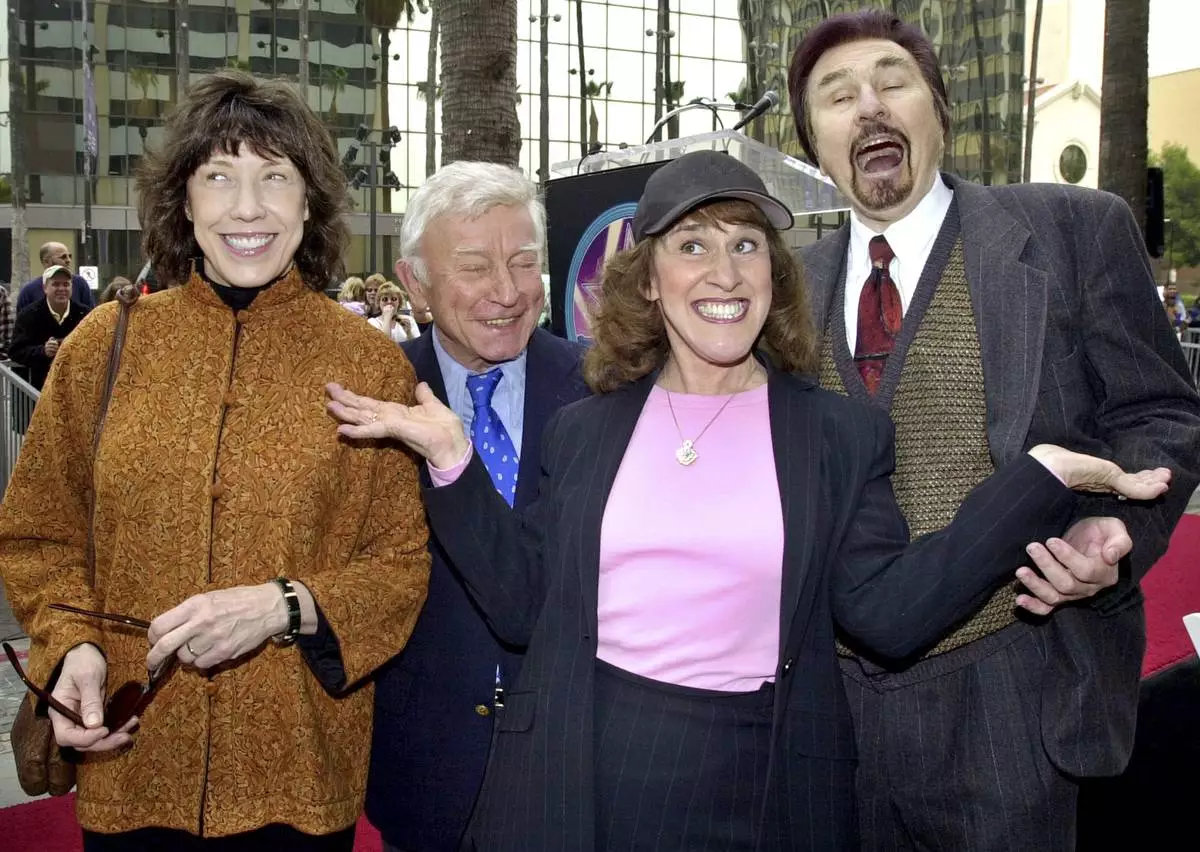
FILE - "Rowan & Martin's Laugh-In" cast members, from left, Lily Tomlin, Henry Gibson, Ruth Buzzi and Gary Owens pose for the media Tuesday, April 2, 2002, in the Hollywood section of Los Angeles. (AP Photo/Nick Ut, file)
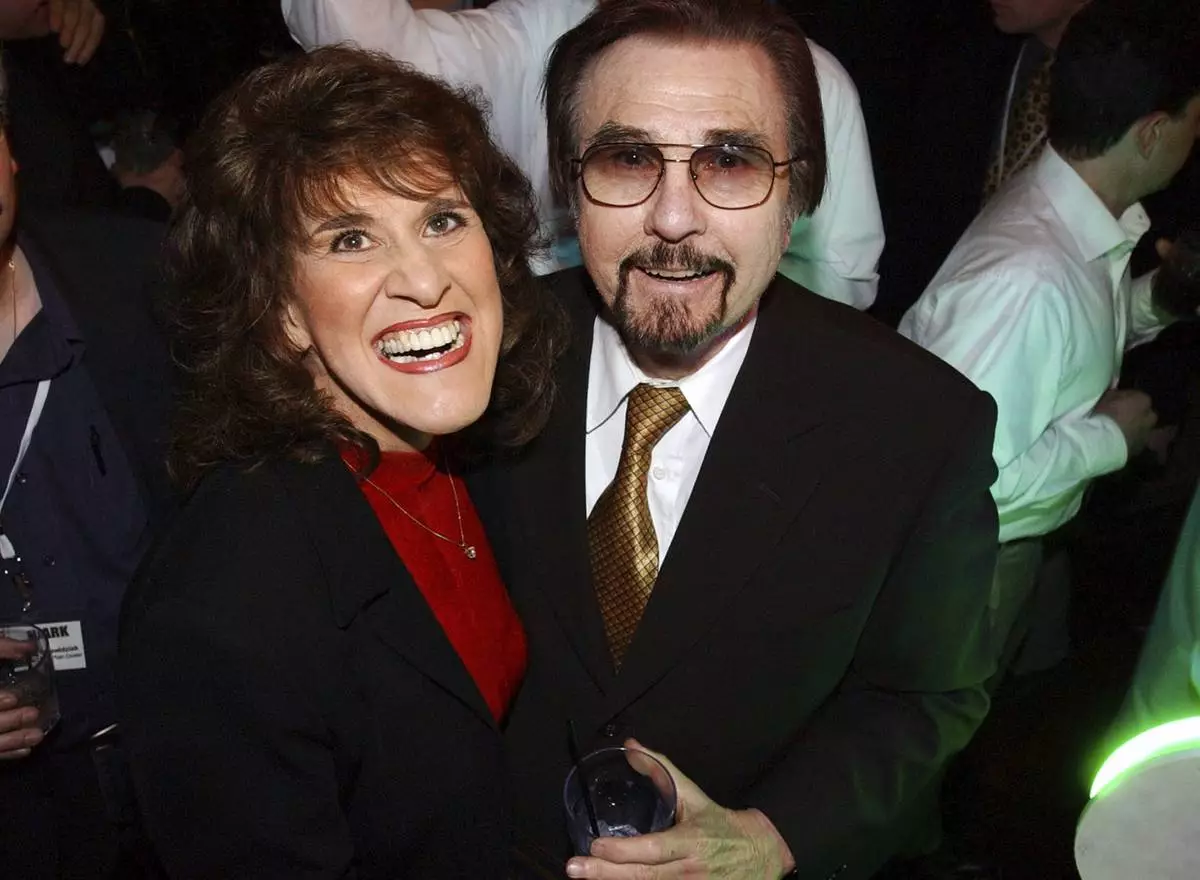
FILE - "Rowan & Martin's Laugh-In" co-stars Ruth Buzzi and Gary Owens share a laugh during NBC's 75th Anniversary Party, in Los Angeles, Jan. 9, 2002. (AP Photo/Rene Macura, File)








